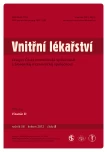-
Medical journals
- Career
Interactions between glucocorticoids and warfarin in chronic inflammatory (autoimmune) diseases
Authors: L. Hromádková; J. Vlček
Authors‘ workplace: Katedra sociální a klinické farmacie Farmaceutické fakulty UK Hradec Králové, vedoucí prof. RNDr. Jiří Vlček, CSc.
Published in: Vnitř Lék 2012; 58(5): 354-356
Category: Reviews
Overview
Glucocorticosteroids are still very important part of the treatment of chronic inflammatory disorders. Their use is often accompanied by unpleasant adverse effects, problems associated with withdrawal during their long-term use and interactions with concomitantly administered drugs. One of the important interactions that may often occur in clinical practice is interaction with warfarin. Despite the fact that as glucocorticosteroids so warfarin are used for many years and seem to be completely known, their co-administration is still accompanied by uncertainties. The interaction may have pharmacodynamic or pharmacokinetic character and both types result in increased risk of bleeding. The pharmacodynamic interaction can be expected to increase a risk of gastrointestinal bleeding to which a gastrotoxicity of glucocorticosteroids contributes. A pharmacokinetic interaction is considered to influence a hepatic metabolism of warfarin and to increase its availability. The exact mechanism is still not fully understood. Manifestations of both types of interactions are taken up with a delay. Co-administration requires increased attention and close monitoring of international normalized ratio. At higher doses of glucocorticosteroids proton pump inhibitors are also effective in prevention of gastrotoxicity.
Key words:
glucocorticosteroids – warfarin – interaction – rheumatology – autoimmune disorders
Sources
1. Product information. Medrol (methylprednisolone). Pfizer Inc., Prague, Czech Republic, November 2009.
2. Carson JL, Strom BL, Schinnar R et al. The low risk of upper gastrointestinal bleeding in patients dispensed corticosteroids. Am J Med 1991; 91 : 223–228.
3. Hazlewood KA, Fugate SE, Harrison DL. Effect of oral corticosteroids on chronic warfarin therapy. Ann Pharmacother 2006; 40 : 2101–2106.
4. Kaufman M. Treatment of multiple sclerosis with high-dose corticosteroids may prolong the prothrombin time to dangerous levels in patients taking warfarin. Mult Scler 1997; 3 : 248–249.
5. Costedoat-Chalumeau N, Amoura Z, Aymard G et al. Potentiation of vitamin K antagonists by high-dose intravenous methylprednisolone. Ann Intern Med 2000; 132 : 631–635.
6. Bai XB, Liu CX. Overview of major CYP450 isoforms and “Cocktail Approach”. Asian J Drug Metabolism Pharmacokinetics 2005; 5 : 257–264.
7. Sharif Z. Pharmacokinetics, metabolism, and drug interactions of atypical antipsychotics in special population. J Clin Psychiatry 2003; 5 (Suppl 6): 22–25.
8. DRUGDEX® System [intranet database]. Version 5.1. Greenwood Village, Colo: Thomson Reuters (Healthcare) Inc.
Labels
Diabetology Endocrinology Internal medicine
Article was published inInternal Medicine

2012 Issue 5-
All articles in this issue
- Endoscopic retrograde cholangiography with a single-balloon enteroscope in patients with Roux-en-Y hepatico jejunal anastomosis
- Interactions between glucocorticoids and warfarin in chronic inflammatory (autoimmune) diseases
- Scoring systems to evaluate prognosis of community-acquired pneumonias
- Eyelids with yellow granulomas and cough – periocular xanthogranuloma associated with adult-onset asthma. A case study and an overview of clinical forms of juvenile xanthogranuloma and its therapy
- The importance of vitamin D – new knowledge suggesting its role in medicine
- Vitamin D receptor gene polymorphism
- Vitamin D and cardiovascular risk
- Vitamin D in aortic stenosis
- Vitamin D and neurological diseases
- Calcitriol endocrine microsystems – developmental aspects and prerequisites for their lifelong functionality
- Vitamin D metabolism
- D vitamin and immunity
- Will vitamin D become a new antidiabetic?
- Internal Medicine
- Journal archive
- Current issue
- Online only
- About the journal
Most read in this issue- Vitamin D metabolism
- Vitamin D and neurological diseases
- Eyelids with yellow granulomas and cough – periocular xanthogranuloma associated with adult-onset asthma. A case study and an overview of clinical forms of juvenile xanthogranuloma and its therapy
- Scoring systems to evaluate prognosis of community-acquired pneumonias
Login#ADS_BOTTOM_SCRIPTS#Forgotten passwordEnter the email address that you registered with. We will send you instructions on how to set a new password.
- Career

